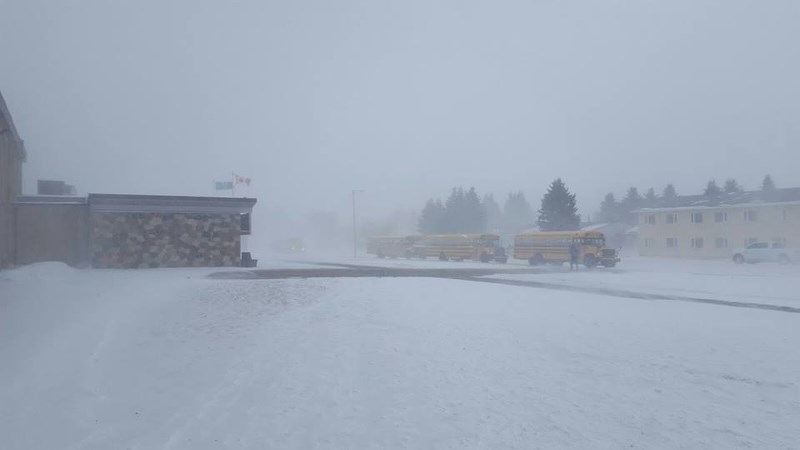While less hardy souls in milder parts of the world see their lives grind to a halt at the faintest dusting of snow or ice, the prairie provinces are used to continuing business as usual even in the midst of dangerously frigid conditions, as was seen in the region just last week.
Temperature swings ranging from 40 to 60 degrees were forecast for the prairies, with mild Pacific air flowing eastward bringing a welcome respite from temperatures that sank to below -40 with the wind chill during last week. Weather advisories were issued about extreme cold and blowing snow and low visibility on Wednesday, with school buses sent home early, and other school buses were called off the following morning.
Doug Fedoruk, St. Paul Education Regional Division’s director of transportation, agreed that in Alberta, people continue their lives throughout all kinds of weather, but when it comes to calling off buses, there’s a process that central office and schools follow.
“If, for example, I woke up at five in the morning, and it was -40 across the division, I might make a call on behalf of the division to call off buses,” he said, noting -40 degrees air temperature or -40 or below with windchill or poor road conditions are the determinants for calling off buses. However, weather can vary from one end of the division’s area to another, he noted.
“That’s why we don’t shut down buses across the division,” he said, adding if the weather is on that borderline of extreme cold, the division consults with school principals, with bus drivers also providing input, as to whether the routes will run.
Even individual routes can vary – one driver may opt out of driving because of slick roads due to black ice, while another’s route may be fine. All bus drivers have the right to shut down a route if they do not feel it is safe, he said, adding parents also have the right to make the call about sending their child on a bus.
“We try to make the best decisions with the information we have at any specific time, but please know that we respect your final decision as a parent as to whether or not your child should ride the bus,” wrote Supt. Glen Brodziak in an explanation about the inclement weather policy, which was posted in response to questions from parents last week, and which can be found on SPERD’s website.
Due to the road conditions, one accident was reported on Wednesday, according to St. Paul RCMP Const. Allan Watt.
As the Jan. 11 afternoon progressed and high winds blew snow across the highway, RCMP responded to a vehicle collision just west of St. Paul on Highway 29, in which a vehicle rear-ended another, due to following too closely. No one was injured in that instance.
“When the visibility is low like that, it’s a no brainer, you just increase your distance; slow down,” he said, adding in extremely poor visibility conditions, people may want to travel with their hazard lights on.
“Make sure you have a winter safety bag, flares, signals, extra pair of boots, a coat . . . shovels are a good idea,” said Watt of travelling in extremely cold weather, adding cell phones are, of course, good to have at all times in case of emergency.
While most people are able to get inside and stay inside during cold weather snaps, not everyone has a place to find shelter. But the Mannawanis Native Friendship Centre always provides one place that’s open to warm up, with hot coffee and public washrooms available.
“Even during the cold snap, we stayed open past the regular hours, because I was afraid some of the guys would be left in the cold,” Mannawanis executive director Hinano Rosa said, adding most people who typically can be seen on the streets of St. Paul just seemed to stay home. The few he knew that had no home of their own were able to find couches on which to sleep, he said.
He notes some people looking for shelter might have stayed away from the Mannawanis Native Friendship centre, knowing that it has a zero tolerance policy for drugs and alcohol use, but he said in times of extreme weather, those rules about intoxication are relaxed.
“If they come to the centre during this cold snap, I would have let them in anyway, just to make sure nobody freezes.”
The centre does have a clothing bank that’s well used, and people have been generous in donating items like coats, tuques and mitts, said Rosa, adding people are welcome to make donations to the bank if they so wish.



